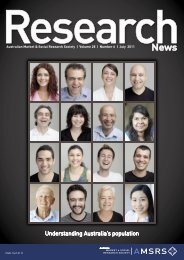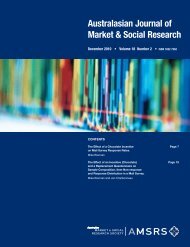Asia Pacific region - aprc-research
Asia Pacific region - aprc-research
Asia Pacific region - aprc-research
You also want an ePaper? Increase the reach of your titles
YUMPU automatically turns print PDFs into web optimized ePapers that Google loves.
FEATURE<br />
duck because I say, “Now I have to go home and tend to my kids”.’<br />
Before moving to China, Atsmon spent a couple of months<br />
learning Mandarin. ‘Many people, when they arrive here, are totally<br />
immersed in their careers and it is difficult to take time off to learn<br />
a bit of Chinese. But if you have done a foundation course prior to<br />
coming it can be a springboard to further learning.’<br />
It is rare for expats to end up in qualitative moderating roles<br />
because of the language barrier. Atsmon explains that even local<br />
moderators sometimes have difficulties because of the many different<br />
dialects.<br />
Another thing to keep in mind when working in China is that<br />
there is no such thing as an awkward silence and that it is important<br />
to be persistent and patient.<br />
‘They can be silent until tomorrow. But once they talk they are<br />
blunt. It can be very refreshing so you just have to develop a thick<br />
skin. It is never intended to be malicious, it is about being communal,<br />
everyone is your friend and wants to help you,’ Atsmon explains.<br />
Jason Spencer is the managing director for Millward Brown<br />
ACSR. He arrived in Shanghai from Australia for the first time in<br />
1993. After a couple of years working in market <strong>research</strong> and as<br />
interpreter in both Hong Kong and Taiwan, Spencer had the opportunity<br />
to assist a colleague in starting up a new <strong>research</strong> company.<br />
‘I was in a fairly senior position by that stage, working as a<br />
<strong>research</strong> director. But I didn’t feel like I had the knowledge and experience<br />
to back me up. I felt that I was the white guy being pushed<br />
out there to face the client and I didn’t think I had the substance to<br />
support that. So I spoke to a contact of mine at Millward Brown. He<br />
said, “OK I’ll train you” and gave me a pay cut and put me down a<br />
level which was OK, I suggested he’d do that.’<br />
Within 12 months Spencer was promoted and had gained a lot<br />
of experience and skills. ‘I really found that I had achieved what I<br />
wanted to achieve in terms of having the substance to stand up<br />
there and speak confidently to clients.’<br />
What attracts Jason to working in China is that it is challenging.<br />
‘In the last few years we have a group of clients that are extremely<br />
sophisticated and I would say even more sophisticated than what<br />
you would consider best practice in North America, Western Europe,<br />
Australia and New Zealand.’<br />
Spencer explains that there are also those clients who are less<br />
experienced in using and disseminating market <strong>research</strong> throughout<br />
their organisations and these require a different set of skills.<br />
‘We have to convince them of the value of doing market <strong>research</strong>;<br />
we have to work hard at that and be emphatic with them. We need<br />
to take ourselves out of the comfort zone and experience someone<br />
else’s concerns and anxieties. So the spectrum that we need to cover<br />
can be quite diverse.’<br />
Local Chinese companies are becoming more interested in doing<br />
<strong>research</strong>, Spencer says. ‘We recently finished the top 50 Chinese<br />
Brands study that looks at quantifying the value of a brand. We have<br />
a unique situation where a lot of Chinese brands are starting to appreciate<br />
the value of a brand.’<br />
He adds, ‘the market is constantly evolving, constantly developing;<br />
it’s a changing environment that suits certain personality types.<br />
There are times when I just need to get out of the country and go<br />
somewhere and lie on a beach to recover. But that’s fine, after a week<br />
I always find myself wanting to get back to the dynamism and the<br />
challenging environment that China is. It’s a beautiful<br />
lifestyle in Australia but after a couple of weeks<br />
back home I find myself with itchy feet.’<br />
‘Most <strong>research</strong>ers in Australia will end up doing<br />
international projects in parts of <strong>Asia</strong> at some point<br />
in the careers,’ says Tracey Rankin from Yellow Door<br />
Research, which has conducted multi-country studies<br />
in the <strong>Asia</strong> <strong>Pacific</strong> <strong>region</strong> for many years. She says one<br />
thing you quickly learn when it comes to qualitative<br />
<strong>research</strong>, is that if you just hand the materials to a<br />
local field team you’ll get a mess.<br />
‘Most of us learn the hard way that you have to be<br />
there on the ground, to make sure they’re asking the<br />
right questions and probing in the right way. You really<br />
get to know a culture when you get things wrong.<br />
And your results are only as good as your<br />
simultaneous translator. Once you establish a good<br />
network in <strong>Asia</strong>, you can tap into that.’<br />
Rankin, who is heading back to India this month to<br />
present her <strong>research</strong> findings to an local client, says<br />
she believes there is a growing market for <strong>research</strong><br />
in the <strong>Asia</strong> <strong>Pacific</strong> <strong>region</strong> and clients are showing<br />
increasing interest in more complex methodologies.<br />
Katarina Olausson moved to Shanghai last<br />
month to work as an account manager at<br />
Firefly Millward Brown<br />
Research News March 2011 19





